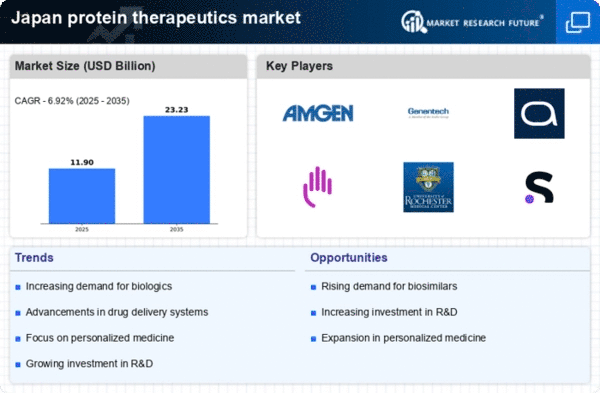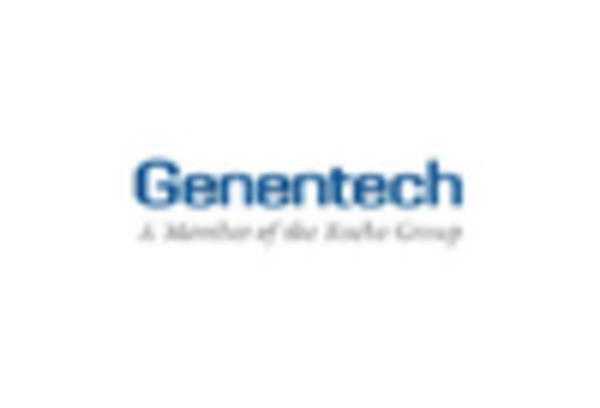Advancements in Biotechnology
Technological advancements in biotechnology are playing a crucial role in shaping the protein therapeutics market in Japan. Innovations in genetic engineering, monoclonal antibody production, and protein design are enhancing the efficacy and safety profiles of therapeutic proteins. For instance, the introduction of next-generation sequencing technologies has streamlined the development of personalized therapies, allowing for more targeted treatment options. The Japanese government has also been supportive of biotechnology initiatives, investing over $1 billion in research and development in recent years. This investment is expected to bolster the protein therapeutics market, as companies leverage these advancements to create novel therapies that address unmet medical needs.
Regulatory Support for Biologics
The regulatory landscape in Japan is becoming increasingly favorable for the protein therapeutics market. The Pharmaceuticals and Medical Devices Agency (PMDA) has implemented streamlined approval processes for biologics, which is likely to accelerate the time-to-market for new therapies. Recent reforms have reduced the average approval time for biologics to approximately 12 months, compared to 18 months previously. This regulatory support not only encourages innovation but also enhances the competitiveness of Japanese biopharmaceutical companies on the international stage. As a result, the protein therapeutics market is poised for growth, with more products entering the market and meeting the needs of patients and healthcare providers.
Aging Population and Healthcare Needs
Japan's aging population is a significant driver of the protein therapeutics market. With over 28% of the population aged 65 and older, there is an increasing demand for effective treatments for age-related diseases, such as Alzheimer's and osteoporosis. This demographic shift necessitates the development of innovative therapeutic solutions that can improve the quality of life for elderly patients. the protein therapeutics market is positioned to address these healthcare needs, as biologics often provide targeted and effective treatment options.. As the population continues to age, the market is likely to expand, driven by the necessity for advanced therapies that cater to this growing demographic.
Increasing Demand for Biopharmaceuticals
The protein therapeutics market in Japan is experiencing a notable surge in demand for biopharmaceuticals. This trend is driven by the growing prevalence of chronic diseases, such as diabetes and cancer, which require advanced therapeutic solutions. According to recent data, the biopharmaceutical sector is projected to grow at a CAGR of approximately 8% over the next five years. This growth is indicative of a broader shift towards biologics, which are often more effective and have fewer side effects compared to traditional small-molecule drugs. As healthcare providers and patients increasingly favor these innovative treatments, the protein therapeutics market is likely to expand significantly, reflecting a shift in therapeutic paradigms within the Japanese healthcare system.
Growing Investment in Research and Development
Investment in research and development (R&D) within the protein therapeutics market in Japan is on the rise. Pharmaceutical companies are allocating substantial resources to discover and develop new therapeutic proteins, driven by the potential for high returns on investment. In 2025, R&D spending in the biopharmaceutical sector is expected to reach approximately $10 billion, reflecting a commitment to innovation. This influx of capital is likely to facilitate the development of cutting-edge therapies that address complex diseases. Furthermore, collaborations between academia and industry are fostering a robust ecosystem for protein therapeutics, enhancing the overall market landscape in Japan.
















